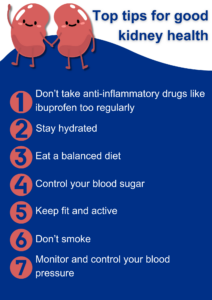Did you know that around 80,000 across the Humber region have chronic kidney disease – and we began treating over 1,000 new patients in the last year alone?
And that’s why today, on World Kidney Day, our teams are going to be on hand to speak to you about the importance of good kidney health.
The team will be in the main foyer at Hull Royal Infirmary from 11am until 3pm, when you can find out more about how to reduce your risk of kidney disease and how organ donation can help to transform the lives of those whose kidneys have failed.

Top tips for good kidney health
Renal Transplant Nurse Practitioner, Elaine Harrison, said: “Your kidneys play a vital role in your overall health as their main function is to remove toxins and excess water from your blood. They also help to control your blood pressure, produce red blood cells and keep your bones healthy.
“It’s important to be aware that while Chronic Kidney Disease is very common – with one in 10 adults having some form of kidney damage – there are often no signs or symptoms of anything being wrong until the disease is in its late stages.
“Detecting kidney disease early can make a significant difference in how we can treat and manage your condition, so if you’re at risk of kidney disease it’s important that you get tested regularly.”
Factors which can increase the risk include:
- Diabetes
- Hypertension
- Cardiovascular disease
- Obesity
- A history of kidney disease in your family
Elaine added: “On World Kidney Day, we want to help spread the word about the importance of getting regular tests but also how to reduce the risk of developing kidney disease.
“Things that are good for your general health are great for keeping your kidneys healthy, such as being fit and active and eating a healthy diet. It’s also important to have a good awareness of things like your blood sugar levels and blood pressure and make sure that you keep these in check.
“Unsurprisingly, good hydration is brilliant for kidney health. How much water you need to drink depends on lots of factors, including how active you are and how hot it is but, as a general rule, most people need around two litres of water a day.
“Smoking can adversely affect kidney health, as it slows the flow of blood to the kidneys and can decrease their ability to function normally. It’s also important not to take over-the-counter pain killers such as ibuprofen regularly, as this can also harm your kidneys.”
Transplants – giving the gift of life
A kidney transplant can transform the life of someone with kidney disease – across NHS Humber Health Partnership, we are currently caring for 522 patients who have undergone kidney transplants.
Kidneys are the most commonly donated organs donated by living people, and about a third of all kidney transplants carried out in the UK are from living donors.
Kidneys can be donated to a friend or family member, or someone you don’t already know – and, in most cases, donations from living donors offer the best long-term outcome for the recipient.
Studies have shown that the average patient survival at 10 years is 90% with a living donor transplant compared to 75% after a deceased donor transplant – although, of course, both options are much better than having no transplant at all.
Anyone volunteering to donate a kidney is asked to undertake a series of tests, so the medical team can be absolutely sure they are suitable – and the health and safety of the potential donor is the primary concern. It’s also important to note that the process is completely voluntary, and the donor is able to change their mind, right up to the point of having the surgery.
People who are not compatible with close relatives, can donate to a pool where the most suitable matches can then access a kidney.
Another way you can help is to register as an Organ Donor, giving permission for your organs and tissues to be donated after you have died.
Not many people die in circumstances that make it possible for them to donate their organs – but for those who do, they can save up to nine lives, which is why every potential donor is so precious.
Ian Hoggarth signed the Organ Donation register six weeks before he tragically died from Sudden Cardiac Death.

Ian Hoggarth
His proud mum, Barbara said: “He has just moved to manager for a new job and renewed his driving licence – signing up to the Organ Donation register to agree to his organs and tissues being donated.
“We, as a family, also gave permission for this to happen and one of his kidneys went to a family man in his twenties.
“The other went to a lady called Jane in her forties. She had been diabetic from the age of nine and on dialysis for three years.
“We have been in touch with Jane in Scotland for many years and have become good friends. We never underestimate what she has gone through and the ongoing medication and checks she has to endure. However, she has told us how amazingly Ian’s gift has changed her life.
“She has been able to travel to see relatives in Canada. She has seen her nephews grow up and one now has a daughter who is her great niece. She adores her.
“She tells everyone to consider Organ Donation and sign up with their wishes online, to share their decision with their family and make a difference should the unthinkable happen.”

